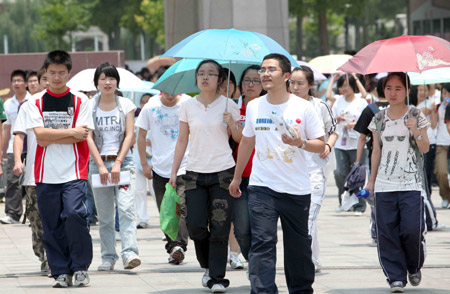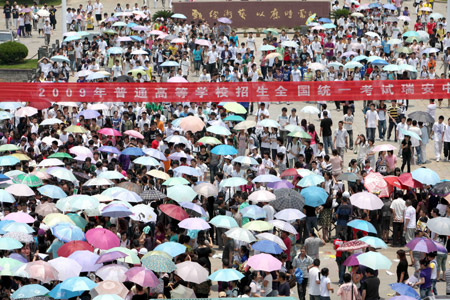"You want an interview? Talk to me!"
That was the confident invitation to China Daily from Ma Yang after he finished the first day of the national college entrance exam, or gaokao, yesterday afternoon.
Standing outside the test center in Beijing, the chubby 18-year-old and his classmates were talking loudly about the two tests they just finished: Chinese and mathematics.
 |
|
Chinese students and their family members walk home after they finished the first day tests of the National College Entrance Examination, which will last until Tuesday for three days across China, in Rui'an city in east China's Zhejiang province, June 7, 2009. Some 10.2 million Chinese school students are to compete this year in the world's largest annual examination for a quota of 6.29 million to learn in universities and colleges. [Xinhua] |
Unlike the hundreds of anxious parents waiting outside the school, most test-takers looked relaxed and calm.
"The exam wasn't quite the battlefield as others made it out to be," he said. "I felt it was just an ordinary test."
Jiang Jun, also 18, said: "I feel very relaxed. All I want to know is that I have done my best, and if I don't make it, I'll have no regrets."
Yesterday, the first group of about 10.2 million youths born after 1990 sat for the world's biggest exam by numbers, regarded by many a once-in-a-lifetime opportunity to get into university.
But the contrast with college aspirants in the decade before was stark: The post-90s generation has grown up in the information age and enjoys far more material benefits. They are typically described as "more independent" and "self-centered".
 |
|
Chinese students and their family members walk home after they finished the first day tests of the National College Entrance Examination, which will last until Tuesday for three days across China, in Rui'an city in east China's Zhejiang province, June 7, 2009. Some 10.2 million Chinese school students are to compete this year in the world's largest annual examination for a quota of 6.29 million to learn in universities and colleges. [Xinhua] |
As for the make-or-break exam, this generation seems to suffer less pressure and is more confident, thanks to the expansion of higher education system which can absorb more than 60 percent of high school graduates, far more than in previous generations.
"These kids are very balanced, and can juggle their studies with their lifestyle quite well," Liu Haiyan, a student's mother, said.
"They are quite realistic and are clear-minded about their future." Her daughter, Wang Tiaoxiao, went all out the past year to prepare for the exam, studying at school from 6:30 am to 10:30 pm six days a week with only Sundays off.
"But she looks at ease these days, and had a good sleep last night," Liu said.
The national college entrance exam was reinstated in 1977 after the "cultural revolution" (1966-76). About 5.7 million people sat for the exam that year, and only 4.7 percent got into university.
(China Daily June 8, 2009)